January 5, 2021 at 8:53 pm

A food pantry is what it is because of three things:
the economic situation at the moment
the volunteers
the people who shop there.
The people come together looking for groceries but often, they want and need far more.
While the coronavirus pandemic rages, the food pantry lines get longer every pantry day because people, families, deal with change they didn’t ask for.
In short, they are rewriting their destiny stories without a road map or instructions.
A number of the people in the pantry, both shoppers and volunteers, didn’t know about food pantries until circumstances set up a situation where they suddenly looked around a room and realized where they were.
There is a name for their category – SITUATIONAL POOR.
A person fits into the situational poor category when s/he lands in a situation created by an event such as a hurricane, fire, floor, pandemic, or other disaster which destroys the home, car, job.
Pantries offer much – peace, community, spiritual connection, groceries. I always think of a food pantry in the basement of a church as a cross between a church service and a busy pizza place.
A food pantry, and those connected with it, are not a program. They are a community. As volunteers, all we really do is open the door. As all the hungry people walk through the door, they undergo a change somehow.
Each person in a pantry, in whatever capacity, has experienced rejection in some way – too young, too old, too crazy, too sick, too poor, not poor enough.
The food pantry experience does not heal a person, nor does it change the story.
The food pantry experience does not offer therapy.
The food pantry is, instead, a conduit for each person’s own healing.
FOOD PANTRY RULES
Sign your name in the register as you enter the pantry.
Find a place in line.
Do not crowd or block the door to the pantry room.
No more than 2 shoppers are allowed in the pantry at one time.
No more than one new shopper is allowed in the pantry at one time.
Shop for a three-day supply of food for everyone in your household.
Place your selections on the table as you shop.
Respect the restrictions on certain foods.
Finish your shopping in 10 minutes.
Once you begin to bag your groceries, do not continue to shop.
Because the food availability is different each time you shop, it is best to visit the food pantry weekly.
Thank you.
Thurman Greco
P.S. The rules may be different at the pantry where you shop. Each food pantry is different. The space is different. The times the pantry is open is different. The management is different.
These specific rules were used in the food pantry I managed where the people were many, the space small, and the hours few.
Please forward this article to your preferred social media network.
Share it with your friends.
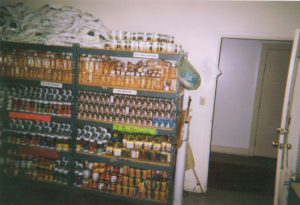
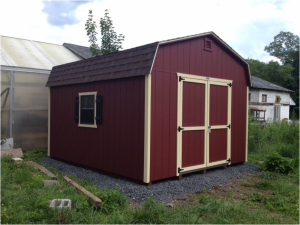
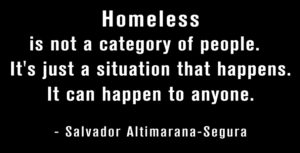

March 31, 2017 at 10:25 pm
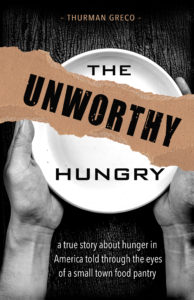
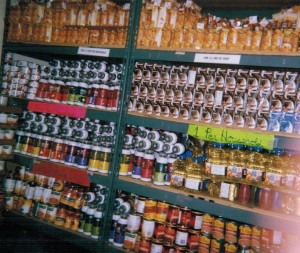
After what seems like eons, this hunger book is finally on the editor’s desk.
This book is long, complicated, and full of information focusing on a subject people know very little about – unless they live and/or work in it. Recently, on the advice of my editor, the book has been divided into three separate books.
Because of these changes, the hunger book will be easier to read and use.
With three volumes, we now have three titles:
“I Don’t Hang Out in Churches Anymore”
“The Unworthy Hungry”
“Hungry in America”
Of course, as a book progresses, things change and then they change again. So, whether it’ll have two sections or three, it’s true that the one volume was way too large.
I’m extremely excited about this project! Our goal for this project is to send the first volume to the publisher by mid-September.
Thank you for reading this blog. Please refer this article to your favorite social media network.
“A Healer’s Handbook” is now available! You can purchase it through Amazon, Barnes and Noble, and my website: http://www.thurmangreco.com.
Thanks!
Thurman Greco












